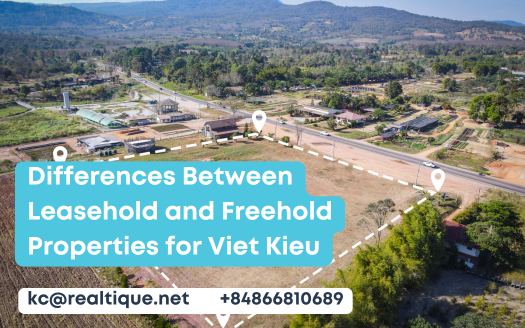Differences Between Leasehold and Freehold Properties for Viet Kieu
When investing in real estate, one of the most crucial decisions is choosing between leasehold and freehold ownership. As a Viet Kieu buyer, understanding these two property ownership structures in Vietnam can significantly impact your investment strategy, returns, and future options. This guide breaks down the differences, benefits, and potential challenges to help you make an informed decision.
Table of Contents
Understanding Leasehold Properties
Definition of Leasehold
A leasehold property is owned by the government or a private entity, and the buyer holds the right to use the property for a specified term. In Vietnam, most leasehold agreements are set for 50 years, particularly for foreigners, including Viet Kieu.
Key Features
- Limited Term: The lease agreement grants usage rights for a predetermined period, typically 50 years.
- Renewal Options: Extensions may be available but are not guaranteed.
- Ownership Restrictions: The land remains under government control, while the buyer owns the structure.
Advantages of Leasehold Properties
- Lower Initial Costs: Leasehold properties are generally more affordable than freehold ones.
- Modern Developments: Many leasehold properties are part of new, high-end projects with premium amenities.
- Investment Potential: Leasehold agreements allow Viet Kieu to invest in areas otherwise restricted to foreigners.
Disadvantages of Leasehold Properties
- Expiration of Lease: At the end of the lease term, the property may revert to the landowner unless renewed.
- Limited Resale Value: Leasehold properties may depreciate as the lease term decreases.
- Dependence on Developers: The renewal process often requires cooperation from the original developer.
Definition of Freehold
A freehold property grants the buyer full ownership of the property, including the land, indefinitely. In Vietnam, freehold ownership is primarily available to Vietnamese citizens or Viet Kieu.
Key Features
- Indefinite Ownership: The property remains with the owner until they choose to sell, transfer, or pass it on to heirs.
- Full Rights: Owners can renovate, lease, or sell without restrictions tied to a lease term.
- Higher Resale Value: Freehold properties typically appreciate in value over time.
Advantages of Freehold Properties
- Security of Ownership: Freehold properties provide lifelong ownership, making them a secure long-term investment.
- Higher Market Demand: These properties often command higher prices due to their unlimited tenure.
- Generational Wealth: Freehold properties can be passed down as inheritance without complications.
Disadvantages of Freehold Properties
- Higher Costs: Freehold properties are usually more expensive than leasehold options.
- Limited Availability: Access to freehold ownership may be restricted for foreigners without Vietnamese citizenship.
Comparing Leasehold and Freehold for Viet Kieu Buyers
Cost Comparison
- Leasehold: Lower upfront costs, making it suitable for first-time investors or those seeking affordable entry points.
- Freehold: Higher investment, but it offers more stability and long-term value.
Ownership Duration
- Leasehold: Fixed-term ownership that requires renewal negotiations.
- Freehold: Permanent ownership, providing long-term security.
Flexibility
- Leasehold: Less flexibility in resale and inheritance due to limited tenure.
- Freehold: Greater control over the property, including renovations, leasing, and resale.
Resale Value
- Leasehold: Depreciates as the lease term decreases, unless renewed.
- Freehold: Appreciates over time, making it a more attractive option for buyers.
Suitability
- Leasehold: Ideal for short- to medium-term investments.
- Freehold: Better for long-term investments or family inheritance.
Legal Implications for Viet Kieu Buyers
Eligibility
- Viet Kieu with proof of Vietnamese ancestry can own freehold properties.
- Foreigners without Vietnamese ancestry are limited to leasehold ownership.
Documentation
- Leasehold properties require renewal documentation if the lease expires.
- Freehold properties require proof of Vietnamese citizenship or Viet Kieu status.
Inheritance and Succession
- Leasehold properties may face complications in inheritance if the lease term expires.
- Freehold properties can be seamlessly transferred to heirs.
Renewal and Termination
- Leasehold agreements must be renegotiated at the end of the lease term.
- Freehold properties do not require renewal, ensuring uninterrupted ownership.
Choosing the Right Option for Your Needs
Short-Term Goals
If your goal is to invest in Vietnam for 5-10 years, leasehold properties may provide the best return on investment with lower costs and modern amenities.
Long-Term Goals
For those looking to secure a property for generations or as a primary residence, freehold ownership is the clear choice, offering unmatched stability and resale potential.
Investment Strategy
- Leasehold: Ideal for investors seeking rental income in areas with high tenant demand.
- Freehold: Suitable for investors focused on capital appreciation and long-term asset security.
Key Questions to Ask
- What are your long-term plans for the property?
- Can you afford the higher cost of a freehold property?
- Are you eligible for freehold ownership as a Viet Kieu?
- How does the location and type of property align with your goals?
Understanding the differences between leasehold and freehold properties is crucial for Viet Kieu buyers navigating Vietnam’s real estate market. Leasehold properties offer affordability and short-term benefits, while freehold properties provide lifelong ownership and long-term stability. By evaluating your goals, eligibility, and investment strategy, you can choose the option that best suits your needs.
If you’re ready to explore Vietnam’s real estate opportunities, contact Realtique for expert guidance tailored to Viet Kieu buyers!





